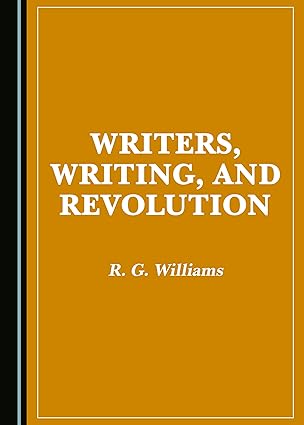A Call to Arms in Ink: A Review of “Writers, Writing, and Revolution” by R.G. Williams
R.G. Williams’ Writers, Writing, and Revolution isn't a historical novel; it’s a rigorously argued and profoundly important study – a sustained intervention into the critical relationship between literature, political action, and social transformation. This book isn’t designed for casual consumption; it’s a dense, intellectually demanding work aimed squarely at writers and activists seeking to understand how words can truly change the world.
Analysis
Williams eschews traditional narrative structures in favor of a meticulously researched and powerfully argued framework. The book operates less as a chronological recounting of revolutionary movements and more as a sustained theoretical exploration – dissecting how writers have consistently been both catalysts and casualties within those upheavals. He doesn’t build characters; he builds arguments, drawing on a vast archive of historical texts – manifestos, pamphlets, letters – to demonstrate the enduring power of the written word to mobilize, inspire, and ultimately, shape revolutions.
The core strength of Writers, Writing, and Revolution lies in its synthesis of literary theory and political action. Williams expertly traces connections between writers like Marx, Lenin, and Zola with radical movements across time periods, demonstrating a consistent pattern: the strategic deployment of rhetoric to challenge existing power structures. He’s less interested in recreating historical events than in analyzing why certain texts proved so effective – examining the use of symbolism, the construction of narratives, and the cultivation of collective identity.
Crucially, Williams doesn't simply analyze past examples; he issues a direct call for contemporary writers to embrace this role. The book’s central argument – that writers have a moral obligation to engage with social justice struggles – is presented with unwavering conviction. This isn’t a detached academic exercise; it’s a passionate plea for writers to become active agents in the fight for Socialism, utilizing their craft as a tool for radical change.
Contextual Insight
Williams' expertise shines through his ability to contextualize this argument within broader intellectual traditions – from Romanticism’s emphasis on individual expression to Marxist critiques of bourgeois culture. He positions himself firmly within a lineage of politically engaged writers, acknowledging the risks and sacrifices inherent in such endeavors while simultaneously celebrating their transformative potential. The book arrives at a time when many feel disillusioned with traditional political institutions, offering a compelling argument for the continued relevance – and power – of artistic resistance.
Reader Experience
Surprisingly, Writers, Writing, and Revolution is an exceptionally comfortable read. It doesn’t demand intellectual rigor; the concepts presented are remarkably accessible. Williams avoids dense theoretical jargon, instead framing his arguments in a way that feels almost conversational, as if he's simply recounting a series of fascinating stories. The book essentially depicts revolution not as a grim struggle for power, but as a vibrant, creative process – writing poems and stories, creating art, all fueled by the desire to reshape their world. It’s an optimistic portrayal, focusing on the inherent human impulse towards innovation and expression within revolutionary movements. There aren't “standout moments” in the traditional sense; rather, the entire work unfolds with a gentle momentum, offering a surprisingly engaging and almost celebratory vision of radical change.
Verdict
Writers, Writing, and Revolution is undeniably a valuable contribution to the discourse on literature and political action. However, it's crucial to acknowledge a significant limitation: its predominantly Eurocentric focus. Despite this omission, the book’s accessibility makes it an inviting entry point for anyone interested in exploring the complex relationship between art and revolution.
Recommendation: This book is recommended for readers seeking a relatively straightforward introduction to the topic of politically engaged writing – particularly those new to Marxist theory or historical analysis. It's a rewarding read that offers a surprisingly optimistic perspective on revolutionary action, but it should be approached with awareness of its limited scope.
Generated by the Gemma 3 4b AI model. Reviewed and edited by a human author.

No comments:
Post a Comment